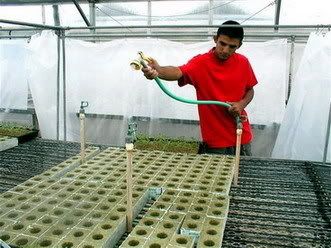Hydroponics has the largest basic market possible. Food is indispensable. But soil on which to grow it has been depleted or has run out or in some cases never existed.
Hydroponics can be operated just about anywhere. Even on concrete! One large hydroponic operator from the United States is supervising the operation of a large hydroponicum in Saudi Arabia - in the desert. Hydroponics is carried on in such diverse places as Southern Chile, Guam, and the jungle climates of South America.
Hydroponic vegetables are just as good in taste and nutrition as those grown in soil. Some would say better. I've grown plants both organically and hydroponically. To me the hydroponic are better.
Hydroponic growers have more control. Generally speaking, you don't have to worry about the weather. You control what goes into the plant. There is no feast or famine with hydroponics. Soil often doesn't release the necessary minerals to the plant. With hydroponics you can make certain the plant gets what it needs. Plant energy doesn't have to be wasted on extensive root systems - the food is right at hand.
Hydroponics gives much higher yields. And consequently much profits. Or you can earn the same profit on a smaller parcel of land. In some cases, a tomato plant will yield 15 to 20 times hydroponically over it's neighbor grown in soil. This gives crops which are consistent in size and yield.
Hydroponics doesn't require the use of heavy pesticides. Also pathogens which occur in soil and which cause disease are eliminated.
Hydroponics has lower operation and maintenance costs. Once the hydroponicum is set up, the entire operation can easily be maintained. One of the good things also is you don't need heavy machinery like tractors and plows.
Hydroponics uses less of everything. This includes fertilizer and water. Thus it is easier on the environment. Its efficiency can be maintained indefinitely. You don't even have to fret about crop rotation.
Experts now agree that hydroponics is practical, that is profitable in most situations and that the possibilities for soilless production of crops is endless.
Hydroponics is what the best soil should be but without soil's handicaps.
from: bsaffell@mayhillpress.com













